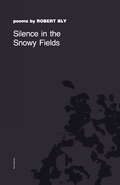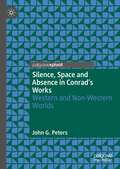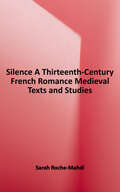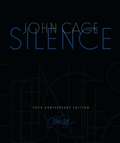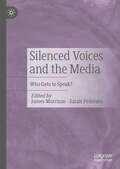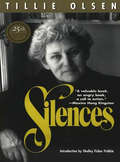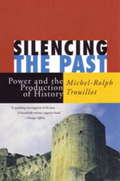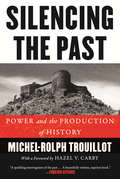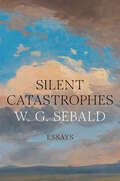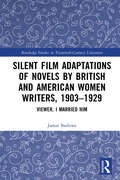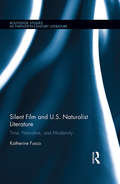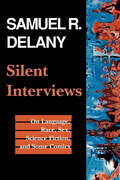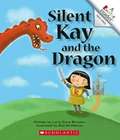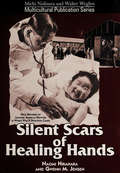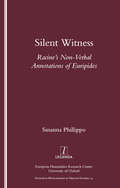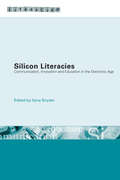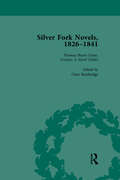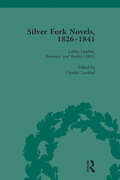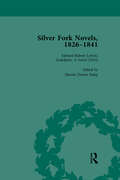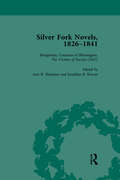- Table View
- List View
Silence in the Snowy Fields: Poems (Wesleyan Poetry Series)
by Robert BlyStriking and moving poems that are rooted deep in the earth The poems of Robert Bly are rooted deep in the earth. Snow and sunshine, barns and cornfields and cars on the empty nighttime roads, abandoned Minnesota lakes and the mood of America now—these are his materials. He sees and talks clearly: he uses no rhetoric nor mannered striving for effect, but instead the simple statement that in nine lines can embody a mood, reveal a profound truth, illuminate in an important way the inward and hidden life. This is a poet of the modern world, thoroughly aware of the complexities of the moment but equally mindful of the great stream of life—all life—of which mankind is only a part.
Silence, Space and Absence in Conrad's Works: Western and Non-Western Worlds
by John G. PetersThis book considers the relationship between sound and silence in the works of Joseph Conrad, along with their ties to Western and non-Western space. Throughout Conrad’s works, a pattern emerges where Western space is associated with sound and non-Western space is associated with silence; similarly, Western space is portrayed as full of objects and activity, whereas non-Western space is portrayed as empty. As these tales progress, though, Conrad’s characters embark on transformational journeys that cause them to reassess the world they live in and sometimes even the nature of the universe. These journeys invariably occur through encountering non-Western space, and during the course of these journeys, the dichotomy between Western space, perceived as replete with sound and activity, and non-Western space, empty of such, blurs such that the fullness of the West is revealed to be simply a surface hiding the emptiness beneath. In the end, both Western and non-Western space are revealed to be absences, as the absence of sound becomes a correlative for the emptiness of space and the emptiness of space becomes a metonym for the cosmological emptiness of nothingness.
Silence: A Thirteenth-Century French Romance
by Sarah Roche-MahdiThis bilingual edition, a parallel text in Old French and English, is based on a reexamination of the Old French manuscript and makes Silence available to specialists and students in various fields of literature and women's studies. <p><p>The Roman de Silence, an Arthurian romance of the thirteenth century, tells of a girl raised as a boy, equally accomplished as a minstrel and knight, whose final task, the capture of Merlin, leads to her unmasking.
Silence: Lectures and Writings (50th Anniversary Edition)
by John Cage Kyle GannSilence, John Cage's first book and epic masterpiece, was published in October 1961. In these lectures, scores, and writings, Cage tries, as he says, to find a way of writing that comes from ideas, is not about them, but that produces them. Often these writings include mesostics and essays created by subjecting the work of other writers to chance procedures using the I Ching. Fifty years later comes a beautiful new edition with a foreword by eminent music critic Kyle Gann. A landmark book in American arts and culture, Silence has been translated into more than forty languages and has sold over half a million copies worldwide. Wesleyan University Press is proud to celebrate the fiftieth anniversary of the book's publication with this special hardcover edition.
Silenced Voices and the Media: Who Gets to Speak?
by James Morrison Sarah PedersenThis edited collection delves into the multifaceted theme of 'Silenced Voices,' showcasing a diverse array of perspectives from scholars around the globe. From historical reflections to contemporary analyses, the book examines the complex dynamics of voice suppression and enablement across different media landscapes. Divided into four thematic sections, the chapters explore the challenges faced by marginalized and mainstream voices alike. From the portrayal of silenced narratives in the news media to the representation of underrepresented groups in cultural production, the collection spans a wide spectrum of issues. Authors employ varied methodological approaches to investigate the silencing of voices in the realms of politics, society, and professional media practices. Offering fresh insights and critical reflections, this volume serves as a timely contribution to ongoing debates surrounding freedom of expression, fake news, and the complexities of contemporary media environments.
Silences
by Tillie OlsenThis book is about silences pertaining to literature. Literary criticism from a feminist perspective. Navigating the spaces in the canon where issues of race, class, and gender have been silenced.
Silences
by Tillie OlsenA landmark survey of disenfranchised literary voices and the forces that seek to silence them—from the influential activist and author of Tell Me a Riddle. With this groundbreaking work, Olsen revolutionized the study of literature by shedding critical light on the writings of marginalized women and working-class people. From the excavated testimony of authors&’ letters and diaries, Olsen shows us the many ways the creative spirit, especially in those disadvantaged by gender, class, or race, has been suppressed through the years. Olsen recounts the torments of Herman Melville, the shame that brought Willa Cather to a dead halt, and the struggles of Olsen&’s personal heroine Virginia Woolf, the greatest exemplar of a writer who confronted the forces that worked to silence her. First published in 1978, Silences expanded the literary canon and the ways readers engage with literature. This 25th-anniversary edition includes Olsen&’s classic reading lists of forgotten authors and a new introduction. Bracing and prescient, Silences remains &“of primary importance to those who want to understand how art is generated or subverted and to those trying to create it themselves&” (Margaret Atwood, The New York Times Book Review). &“A valuable book, an angry book, a call to action.&” —Maxine Hong Kingston &“Silences helped me to keep my sanity many a day.&” —Gloria Naylor, author of Mama Day &“[Silences is] &‘the Bible.&’ I constantly return to it.&” —Sandra Cisneros, author of The House on Mango Street &“Silences will, like A Room of One&’s Own, be quoted where there is talk of the circumstances in which literature is possible.&” —Adrienne Rich, author of Diving into the Wreck
Silencing the Past: Power and the Production of History
by Michel-Rolph TrouillotPlacing the West's failure to acknowledge the most successful slave revolt in history alongside denials of the Holocaust and the debate over the Alamo, Michel-Rolph Trouillot offers a stunning meditation on how power operates in the making and recording of history.
Silencing the Past: Power and the Production of History
by Michel-Rolph TrouillotForeword by Hazel V. Carby A modern classic about power and the making of history, with a new foreword by a prominent scholar Michel-Rolph Trouillot places the West's failure to acknowledge the most successful slave revolt in history, the Haitian Revolution, alongside denials of the Holocaust and the debate over the Alamo and Christopher Columbus in this moving and thought-provoking meditation on how power operates in the making and recording of history. <P><P> Silencing the Past analyzes the silences in our historical narratives, what is left out and what is recorded, what is remembered and what is forgotten, and what these silences reveal about inequalities of power. Weaving personal recollections from his lifetime as a student and teacher of history, Trouillot exposes forces less visible--but no less powerful--than gunfire, property, and political crusades. This twentieth-anniversary edition of Trouillot's pioneering work features a new foreword from renowned scholar Hazel V. Carby that speaks to the continuing influence of Silencing the Past on the fields of anthropology, history, and African American, Caribbean, and postcolonial studies--as well as to the book's unique pedagogical value as an introduction to historical analysis.
Silent Catastrophes: Essays
by W.G. SebaldFrom the renowned author of Austerlitz (named a Top 10 Book of the 21st Century by the New York Times) comes the first English translation of his extraordinary essays on the Austrian writers who shaped his life and work.Silent Catastrophes brings together the two books W.G. Sebald wrote on the Austrian writers who meant so much to him: The Description of Misfortune and Strange Homeland, published in Austria in 1985 and 1991.As a German in self-chosen exile from his country of birth, Sebald found a particular affinity with these writers from a neighboring nation. The traumatic evolution of Austria from vast empire to diminutive Alpine republic, followed by its annexation by Nazi Germany, meant that concepts such as "home/land," "borderland" and "exile" occupy a prominent role in its literature, just as they would in Sebald&’s own.Through a series of remarkable close readings of texts by Bernhard, Stifter, Kafka, Handke, Roth, and more, Sebald charts both the pathologies which so often drove their work and the seismic historical forces which shaped them. This sequence of essays will be a revelation to Sebald&’s English-language readers, tracing as they do so many of the themes which animate his own literary writings, to which these essays form a kind of prelude. This is an essential new edition from &“a writer whose life and work has become a wonderful vindication of literary culture in all its subtle and entrancing complexity&” (The Guardian).
Silent Film Adaptations of Novels by British and American Women Writers, 1903-1929: Viewer, I Married Him (Routledge Studies in Twentieth-Century Literature)
by Jamie BarloweSilent Film Adaptations of Novels by British and American Women Writers, 1903–1929 focuses on fifty-three silent film adaptations of the novels of acclaimed authors George Eliot, Charlotte Brontë, Emily Brontë, Mary Shelley, Louisa May Alcott, Harriet Beecher Stowe, Willa Cather, and Edith Wharton. Many of the films are unknown or dismissed, and most of them are degraded, destroyed, or lost—burned in warehouse fires, spontaneously combusted in storage cans, or quietly turned to dust. Their content and production and distribution details are reconstructed through archival resources as individual narratives that, when considered collectively, constitute a broader narrative of lost knowledge—a fragmented and buried early twentieth-century story now reclaimed and retold for the first time to a twenty-first-century audience. This collective narrative also demonstrates the extent to which the adaptations are intertextually and ideologically entangled with concurrently released early “woman’s films” to re-promote and re-instill the norm of idealized white, married, domesticated womanhood during a time of extraordinary cultural change for women. Retelling this lost narrative also allows for a reassessment of the place and function of the adaptations in the development of the silent film industry and as cinematic precedent for the hundreds of sound adaptations of the literary texts of these eight women writers produced from 1931 to the 2020s.
Silent Film and U.S. Naturalist Literature: Time, Narrative, and Modernity (Routledge Studies in Twentieth-Century Literature)
by Katherine FuscoTypically, studies of early cinema’s relation to literature have focused on the interactions between film and modernism. When film first emerged, however, it was naturalism, not modernism, competing for the American public’s attention. In this media ecosystem, the cinema appeared alongside the works of authors including Charlotte Perkins Gilman, Jack London, and Frank Norris. Drawing on contemporaneous theories of time and modernity as well as recent scholarship on film, narrative, and naturalism, this book moves beyond traditional adaptation studies approaches to argue that both naturalism and the early cinema intervened in the era’s varying experiments with temporality and time management. Specifically, it shows that American naturalist novels are constructed around a sustained formal and thematic interrogation of the relationship between human freedom and temporal inexorability and that the early cinema developed its norms in the context of naturalist experiments with time. The book identifies the silent cinema and naturalist novel’s shared privileging of narrative progress over character development as a symbolic solution to social and aesthetic concerns ranging from systems of representation, to historiography, labor reform, miscegenation, and birth control. This volume thus establishes the dynamic exchange between silent film and naturalism, arguing that in the products of this exchange, personality figures as excess bogging down otherwise efficient narratives of progress. Considering naturalist authors and a diverse range of early film genres, this is the first book-length study of the reciprocal media exchanges that took place when the cinema was new. It will be a valuable resource to those with interests in Adaptation Studies, American Literature, Film History, Literary Naturalism, Modernism, and Narrative Theory.
Silent Hill 2 (Boss Fight Books)
by Mike DruckerA troubled man travels to a mysterious town from his past after receiving a letter from his wife... who's been dead for years. And while our hero explores dark corridors and battles countless disturbing enemies, his journey offers more psychological horror than survival horror. Welcome to Silent Hill, where the monster is you. Silent Hill 2 doubles down on what made the first game so compelling: The feeling of being lost in a foggy, upside-down town as unsettling as it is familiar. Nearly two decades after first experiencing Silent Hill 2, writer and comedian Mike Drucker returns to its dark depths to explore how this bold video game delivers an experience that is tense, nightmarish, and anything but fun. With an in-depth and highly personal study of its tragic cast of characters, and a critical examination of developer Konami&’s world design and uneven marketing strategy, Drucker examines how Silent Hill 2 forces its players to grapple with the fact that very real-world terrors of trauma, abuse, shame, and guilt are far more threatening than any pyramid-headed monster could ever be.
Silent Interviews: On Language, Race, Sex, Science Fiction, and Some Comics-A Collection of Written Interviews
by Samuel R. DelanySamuel R. Delany, whose theoretically sophisticated science fiction and fantasy has won him a broad audience among academics and fans of postmodernist fiction, offers insights into and explorations of his own experience as writer, critic, theorist, and gay black man in his new collection of written interviews, a form he describes as a type of "guided essay." Gathered from sources as diverse as Diacritics and Comics Journal, these interviews reveal the broad range of his thought and interests.
Silent Scars of Healing Hands: Oral Histories of Japanese American Doctors in World War II Detention Camps (Michi Nishiura and Walter Weglyn Multicultural Publication Series)
by Naomi Hirahara Gwenn JensenOn February 19, 1942, by order of President Franklin D. Roosevelt, all Nikkei (American born Japanese American citizens) were subject to an indiscriminate and mass incarceration that affected more than 110,000 people. Within weeks, Issei and Nisei doctors found themselves vaccinating long lines of people in anticipation of their imminent removal from homes and businesses. Cast into temporary detention, these same physicians struggled to open clinics and treat patients in facilities ill prepared for the onslaught of families, pregnant, women, elderly, and toddlers. This book is their story -- a collection of oral histories of Nisei physicians who directed health care behind barbed wires.
Silent Witness: Racine's Non-verbal Annotations of Euripides
by Susanna Phillippo"This is an examination of the influence of the plays of Euripides on the French tragedian Racine, gleaned from Racine's markings on the texts. In her study, Phillippo examines the way in which the creative processes linking the two writers may have worked. She concentrates on the largely unexplored evidence supplied by ""non-verbal"" aspects of the annotations: the markings of lines and passages by underlining, brackets, etc. Such markings suggest how Racine probably understood the Greek ""originals"", and reveal the qualities of the Greek dramatist to which the French writer appears to have responded."
Silicon Literacies: Communication, Innovation and Education in the Electronic Age (Literacies)
by Ilana SnyderElectronic communication is radically altering literacy practices. Silicon Literacies unravels the key features of the new communication order to explore the social, cultural and educational impact of silicon literacy practices.Written by leading international scholars from a range of disciplines, the essays in this collection examine the implications of text produced on a keyboard, visible on a screen and transmitted through a global network of computers. The book covers topics as diverse as role-playing in computer games, the use of graphic symbols in on-screen texts and Internet degree programmes to reveal that being literate is to do with understanding how different modalities combine to create meaning.Recognizing that reading and writing are only part of what people have to learn to be literate, the contributors enhance our understanding of the ways in which the use of new technologies influence, shape and sometimes transform literacy practices.
Silly Cats: A Ridiculous Collection of the World's Goofiest Cats and Most Relatable Memes
by Summersdale PublishersCats are packed with purrsonality, and this book celebrates exactly that. From funny faces to bizarre body positions, silly scenarios to ridiculous reactions, this collection of cat photos will entertain feline fanatics and animal whisperers alike.
Silly Dogs: A Ridiculous Collection of the World's Goofiest Dogs and Most Relatable Memes
by Summersdale PublishersIn honour of man's best friend, this collection of silly dogs, funny captions and relatable memes will brighten your day better than any belly rub. From goofy faces to peculiar body positions, this selection of dog photos will entertain dog parents, pet people and canine lovers alike.
Silver Burdett English
by Marian Davies Toth Betty G. Gray Nancy N. RagnoLanguage Arts Textbook Grade 3
Silver Fork Novels, 1826-1841 Vol 1
by Gary Kelly Harriet Devine JumpThe novels in this collection present a vivid picture of late-Regency society clinging to modes of behaviour which soon became obsolete and mark an important point of transition to Victorian cultural values.
Silver Fork Novels, 1826-1841 Vol 2
by Gary Kelly Harriet Devine JumpThe novels in this collection present a vivid picture of late-Regency society clinging to modes of behaviour which soon became obsolete and mark an important point of transition to Victorian cultural values.
Silver Fork Novels, 1826-1841 Vol 3
by Gary Kelly Harriet Devine JumpThe novels in this collection present a vivid picture of late-Regency society clinging to modes of behaviour which soon became obsolete and mark an important point of transition to Victorian cultural values.
Silver Fork Novels, 1826-1841 Vol 4
by Gary Kelly Harriet Devine JumpThe novels in this collection present a vivid picture of late-Regency society clinging to modes of behaviour which soon became obsolete and mark an important point of transition to Victorian cultural values.
